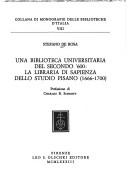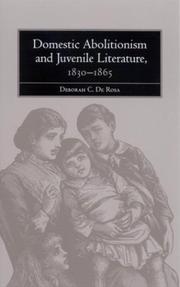| Listing 1 - 10 of 351 | << page >> |
Sort by
|
Book
ISBN: 8821503178 Year: 1981 Publisher: Roma Ed. Paoline
Abstract | Keywords | Export | Availability | Bookmark
 Loading...
Loading...Choose an application
- Reference Manager
- EndNote
- RefWorks (Direct export to RefWorks)
Christianity --- Religion
Book
ISBN: 8801011660 Year: 1998 Publisher: Leumann Elle Di Ci
Abstract | Keywords | Export | Availability | Bookmark
 Loading...
Loading...Choose an application
- Reference Manager
- EndNote
- RefWorks (Direct export to RefWorks)
Book
ISBN: 8801017944 Year: 2000 Publisher: Leumann Roma. Elledici La civiltà cattolica
Abstract | Keywords | Export | Availability | Bookmark
 Loading...
Loading...Choose an application
- Reference Manager
- EndNote
- RefWorks (Direct export to RefWorks)
Book
Year: 1981 Publisher: Milano Ancora
Abstract | Keywords | Export | Availability | Bookmark
 Loading...
Loading...Choose an application
- Reference Manager
- EndNote
- RefWorks (Direct export to RefWorks)
Book
Year: 1999 Publisher: Roma Civiltà cattolica
Abstract | Keywords | Export | Availability | Bookmark
 Loading...
Loading...Choose an application
- Reference Manager
- EndNote
- RefWorks (Direct export to RefWorks)
Book
Abstract | Keywords | Export | Availability | Bookmark
 Loading...
Loading...Choose an application
- Reference Manager
- EndNote
- RefWorks (Direct export to RefWorks)
Book
ISBN: 9051580312 Year: 1990 Publisher: Baarn Arbor
Abstract | Keywords | Export | Availability | Bookmark
 Loading...
Loading...Choose an application
- Reference Manager
- EndNote
- RefWorks (Direct export to RefWorks)
Christian church history --- Church government --- #gsdb8 --- C1 --- pausen --- katholieke Kerk --- theologie --- 262.13 --- #GGSB: Kerkgeschiedenis --- #GGSB: Kerkgeschiedenis (pausen) --- Kerken en religie --- Pausschap. Heilige Stoel. Vaticaan. Paus als soeverein --- 262.13 Pausschap. Heilige Stoel. Vaticaan. Paus als soeverein --- 262.13 Papacy. Holy See. Vatican. Pope as sovereign --- Papacy. Holy See. Vatican. Pope as sovereign --- Kerkgeschiedenis --- Kerkgeschiedenis (pausen)

ISBN: 8822231643 Year: 1983 Volume: vol 8 Publisher: Firenze Olschki
Abstract | Keywords | Export | Availability | Bookmark
 Loading...
Loading...Choose an application
- Reference Manager
- EndNote
- RefWorks (Direct export to RefWorks)
017.1 <45 PISA> --- 378.4 <45 PISA> --- Academic libraries --- -Early printed books --- -Bibliography --- Books --- College libraries --- Libraries, University and college --- University libraries --- Libraries --- Libraries and colleges --- Public libraries --- Catalogi van institutionele bibliotheken--Italië--PISA --- Universiteiten--Italië--PISA --- History --- Bibliography --- -Catalogs --- Early printed books --- Services to colleges and universities --- Biblioteca universitaria di Pisa --- -Biblioteca universitaria di Pisa --- -Pisa. --- Biblioteca Universitaria de Pisa --- Università di Pisa. --- Catalogs --- -Catalogi van institutionele bibliotheken--Italië--PISA --- 378.4 <45 PISA> Universiteiten--Italië--PISA --- 017.1 <45 PISA> Catalogi van institutionele bibliotheken--Italië--PISA --- Bibliography&delete& --- Pisa. --- Catalogs. --- History. --- Pise. Bibliothèque universitaire. Histoire. --- Pisa. Bibliotheek (Niversiteits-). Geschiedenis.
Book
ISBN: 8842037095 9788842037095 Year: 1990 Publisher: Bari: Laterza,
Abstract | Keywords | Export | Availability | Bookmark
 Loading...
Loading...Choose an application
- Reference Manager
- EndNote
- RefWorks (Direct export to RefWorks)
Christian democracy --- Démocratie chrétienne --- Sturzo, Luigi,

ISBN: 0791486303 1417538384 9781417538386 0791458261 9780791458266 0791458253 9780791458259 9780791486306 Year: 2003 Publisher: Albany : State University of New York Press,
Abstract | Keywords | Export | Availability | Bookmark
 Loading...
Loading...Choose an application
- Reference Manager
- EndNote
- RefWorks (Direct export to RefWorks)
Deborah C. De Rosa examines the multifaceted nature of domestic abolitionism, a discourse that nineteenth-century women created to voice their political sentiments when cultural imperatives demanded their silence. For nineteenth-century women struggling to find an abolitionist voice while maintaining the codes of gender and respectability, writing children's literature was an acceptable strategy to counteract the opposition. By seizing the opportunity to write abolitionist juvenile literature, De Rosa argues, domestic abolitionists were able to enter the public arena while simultaneously maintaining their identities as exemplary mother-educators and preserving their claims to "femininity." Using close textual analyses of archival materials, De Rosa examines the convergence of discourses about slavery, gender, and children in juvenile literature from 1830 to 1865, filling an important gap in our understanding of women's literary productions about race and gender, as well as our understanding of nineteenth-century American literature more generally.
Antislavery movements in literature. --- Children's literature, American --- Children --- Slavery in literature. --- American literature --- Slavery and slaves in literature --- Slaves in literature --- History and criticism. --- Books and reading --- History --- Enslaved persons in literature
| Listing 1 - 10 of 351 | << page >> |
Sort by
|

 Search
Search Feedback
Feedback About UniCat
About UniCat  Help
Help News
News